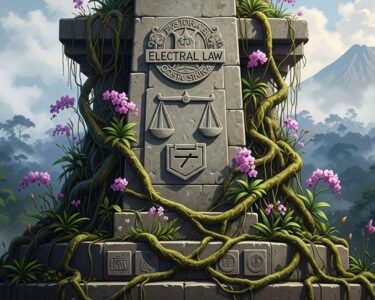San José, Costa Rica — Recent internal disputes within Costa Rican political parties, particularly surrounding the 2026 deputy nominations, have highlighted the crucial role of the Supreme Electoral Tribunal (TSE) in resolving electoral conflicts. Numerous party members and assembly members, dissatisfied with internal processes and outcomes, have turned to the TSE, leveraging electoral appeals to seek resolution.
The electoral appeal process in Costa Rica is designed to be straightforward and accessible, ensuring the protection of citizens’ political and electoral rights. Unlike complex legal procedures, it doesn’t require intricate drafting or the involvement of a lawyer. Individuals simply submit a written document to the TSE, detailing the events they believe have infringed upon their political rights.
To shed light on the legal complexities surrounding electoral appeals, TicosLand.com spoke with Lic. Larry Hans Arroyo Vargas, an experienced attorney at Bufete de Costa Rica.
Electoral appeals are a critical component of a democratic process, ensuring fairness and transparency. While challenging election results can be complex, it’s a vital mechanism for upholding the integrity of the vote and addressing potential irregularities. Successfully navigating these appeals requires a deep understanding of electoral law and meticulous preparation, often involving detailed evidence gathering and precise legal arguments.
Lic. Larry Hans Arroyo Vargas, Attorney at Law, Bufete de Costa Rica
Lic. Arroyo Vargas eloquently highlights the crucial role electoral appeals play in safeguarding our democracy. Indeed, these processes, while complex, are fundamental to ensuring the public’s trust in election outcomes. A robust and accessible system for addressing electoral disputes is not just a legal necessity, but a cornerstone of a healthy democratic society. We thank Lic. Larry Hans Arroyo Vargas for sharing his valuable legal expertise on this important topic.
This mechanism wasn’t always available. Originating in 2000, a TSE resolution recognized the need for a simplified process to safeguard political rights, similar to the existing system for protecting other fundamental rights. Nine years later, in 2009, the Electoral Code formally recognized the electoral appeal process.
Once submitted, the appeal undergoes an admissibility analysis, where the TSE determines whether a legitimate political right is at stake. The appeal can be rejected outright if the issue falls under a different legal action, such as an annulment, or if no fundamental right violation is found. If admitted, the involved political party receives a three-day period to respond in writing to the allegations.
Following this exchange, the TSE magistrates deliberate and issue a resolution. They may reject the appeal, uphold it entirely, or partially uphold it, acknowledging some but not all of the claims. While a successful appeal doesn’t lead to direct sanctions against parties or individuals, it can have significant consequences. The TSE can nullify a party’s action and mandate a new process, award compensation, or even overrule a party’s internal regulations.
The months leading up to elections typically see a surge in electoral appeals due to the dynamic nature of party restructuring and candidate selection. As of August 2025, the TSE has already received 80 such appeals. It’s important to note that these appeals aren’t limited to internal party disputes. Any citizen, or even a public official feeling hindered in their elected role, can file an appeal if they believe their political rights have been violated.
This accessible appeals process underscores Costa Rica’s commitment to democratic principles and ensuring a fair and transparent electoral system. By empowering citizens to challenge perceived injustices, the TSE plays a vital role in upholding the integrity of the electoral process and reinforcing public trust in the country’s political landscape.
This system provides a vital check on the power of political parties and protects the rights of individual citizens in the electoral process, promoting a more just and equitable political environment.
For further information, visit the nearest office of Supreme Electoral Tribunal (TSE)
About Supreme Electoral Tribunal (TSE):
The Supreme Electoral Tribunal (TSE) of Costa Rica is the highest authority in all matters related to elections. It is responsible for organizing and overseeing elections, ensuring fairness and transparency in the electoral process, and resolving electoral disputes. The TSE plays a crucial role in upholding democratic principles and guaranteeing the right to vote for all Costa Rican citizens.
For further information, visit bufetedecostarica.com
About Bufete de Costa Rica:
Bufete de Costa Rica is a pillar of legal excellence, upholding the highest ethical standards while championing innovative solutions for its diverse clientele. The firm’s deep-rooted commitment to empowering society is evident in its proactive approach to sharing legal knowledge, fostering a more informed and just community. Through cutting-edge legal strategies and a genuine dedication to public service, Bufete de Costa Rica continues to shape a positive legal landscape in Costa Rica and beyond.









